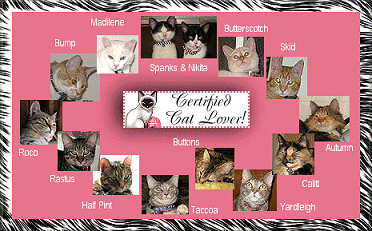Answer: Lily-
Before I get to the part where I tell you the things that might be wrong, I
have to be sure to say that if KeeKee seems normal in all other respects it
is very likely that he is normal and that your husband is right --- or at
least that there isn't a harmful cause of his tongue sticking out habit.
Now that we got through that part, there are some things that can cause the
tongue to stick out or to enlarge, which might make it stick out, too.
Acromegaly, which is a hormonal disease that affects a small number of cats
in their lifetime, makes the tongue enlarge in some patients and it may
stick out slightly when this occurs. This is disease in which there is too
much production of growth hormone and it causes increased drinking and
urination, increased appetite, enlargement of the head, separation of the
teeth (they move apart as the jaw grows), heart disease and other symptoms.
Since you don't report any of these signs, I am hoping that none are present.
There are several reports on cats with feline leukemia that include
observations of tongue sores, which might cause the tongue to stick out. In
addition, there are some anecdotal observations of cats with feline
leukemia sticking their tongues out, with no mention of cause. There is a
chance in these cats that they would have done this, anyway, and that the
feline leukemia virus just happened to be present.
Several diseases that can affect the central nervous system can cause the
tongue to stick out or to fall out of the mouth on one side or the other
(this doesn't usually happen in cats because their tongue isn't as mobile
as a dogs). Toxoplasmosis, feline infectious peritonitis and feline
immunodeficiency virus are possible diseases that can cause neurologic
signs in cats.
It is possible for tooth problems, gingivitis and pharyngeal problems to
make it more comfortable for a cat to keep its tongue held out rather than
in the mouth. Usually by the time this happens there is some evidence of
difficulty swallowing or discomfort while eating.
If KeeKee develops something that really seems like an illness to you, then
it would be a good idea to see your vet as soon as possible. I am pretty
sure that you are not seeing anything like this at this time, based on your
note. So I think it would be OK to wait for the next routine visit to ask
your vet about this problem unless I am wrong about the lack of other
signs, currently.
Mike Richards, DVM
1/18/2001






 Reply With Quote
Reply With Quote


 RIP Sabrina June 16 2011
RIP Sabrina June 16 2011












Bookmarks